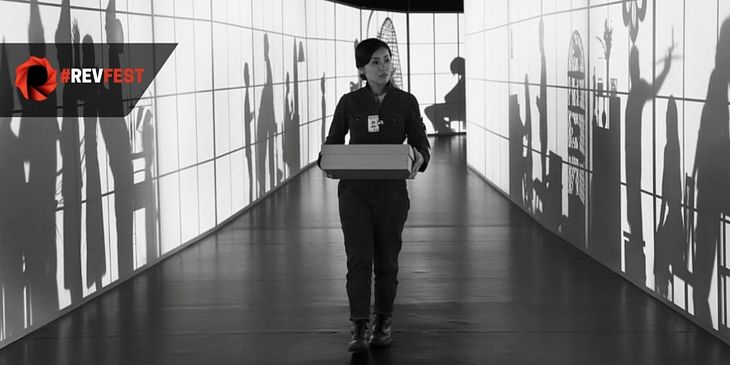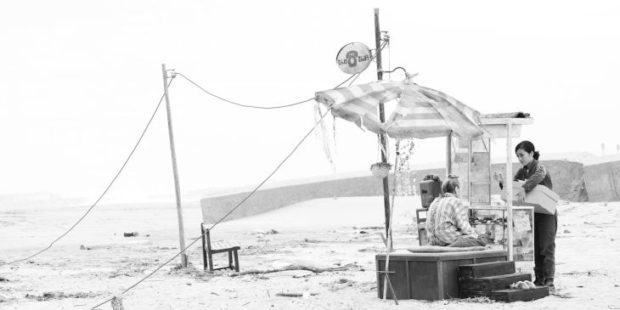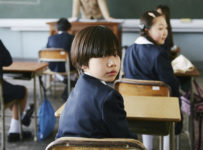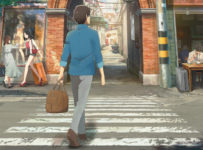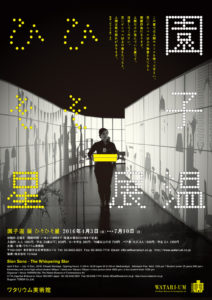 Sion Sono’s hypnotic, lo-fi journey through the stars is a wholly unique experience, and an amazing accomplishment in visually-driven storytelling.
Sion Sono’s hypnotic, lo-fi journey through the stars is a wholly unique experience, and an amazing accomplishment in visually-driven storytelling.
It’s possible Japanese director and avant garde artist Sion Sono never stops making films. Indeed, credited with 6 features in 2015 alone, many of them disappear in the international market, so it’s always a treat when one of them features at our many festivals. His films to date have been taste-pushing and overindulgent forays into sex and violence (Guilty of Romance), four hour epics in the case of Love Exposure, or more emotional character-focused studies (Himizu). With THE WHISPERING STAR, Sono delves into science-fiction territory, and proves to be a master of that as well.
Set in an universe where 80% of the population is made up of androids. The film follows a female unit named Yoko (Megumi Kagurazaka) whose job it is to deliver parcels to distant human outposts. Each trip takes years to make, and the ship itself looks like a traditional Japanese house with an engine on the back of it. Her only companion, and one of the handful of whispered voices in the film, is the ship’s computer. Shot in stark black and white, the real-life devastated area of Fukushima doubles as the alien landscapes she visits in this lo-fi sci-fi flick.
Science-fiction works best when it is commenting on human issues, and Sono has been exploring the unspeakable losses of a post-Fukushima Japan since at least Himizu, along with a fictive version in 2012’s The Land of Hope. Where those films explored the societal fallout in a post-disaster setting, this goes one step further to explore humanity via a post-human narrative. Simple repetition, opening on a pot of tea being boiled over the course of a week (or is it 7 different pots being prepared?), not only messes with our notion of time but sets the tone early. We are witnessing the echoing fragments of humanity, androids imbued with our habits. Yoko deliveries contain knick-knacks and other human ephemera, eliciting emotive responses from recipients who had almost forgotten their meaning. Yoko herself is human enough to catch a cold, feeling odd moments of curiosity, all the while replacing her own AA batteries when she senses a malfunction.
Shot in high-contrast black and white, there’s a little bit of Andrei Tarkovsky in the genes of this film, representing something of a departure from Sono’s earlier excesses. The stunning and unreal exteriors of the ship/house are like a hyper-real Georges Méliès on crack, while Hideo Yamamoto’s (The Grudge, Audition) crisp photography of Fukushima’s landscapes contrast their understated chaos against the slate-grey of the skies. The handful of humans in these environments, actually cast from the region, can be seen as either the last vestiges of humanity or artifacts themselves. Sound design is just as deliberate, with the taciturn dialogue never raising above a whisper, even when Yoko is recording her thoughts on a reel-to-reel tape deck. On one planet, any sound above 30 decibels is outlawed, and all human interaction is seen in silhouetted shadowplay.
THE WHISPERING STAR is one of Sono’s most mature works to date, not simply because it is free of the sexualised violence that has dominated those works released outside of Japan. Sono’s frequent collaborator Kagurazaka is terrific in the lead, a thematic extension of the restrained housewife in Guilty of Romance. It’s a film that allows viewers to explore the space in between moments, all the while reminding us to ask how humans can continue to define themselves in the wake of a massive tragedy that took away many of the things that defined that humanity.
2015 | Japan | DIR: Sion Sono | WRITERS: Sion Sono | CAST: Megumi Kagurazaka, Kenji Endo, Yûto Ikeda | DISTRIBUTOR: Revelation Film Festival | RUNNING TIME: 100 minutes | RATING: ★★★★

